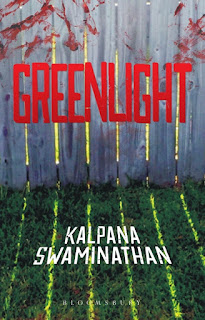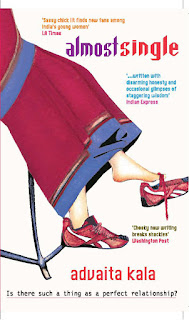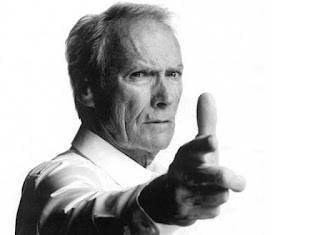It was in 2015, I read and reviewed Minal Sarosh's début novel ‘Soil for My Roots ’. She started her literary career as a poet writing in English. She won the commendation prize in the All India Poetry Competition 2005 organised by the Poetry Society (India) Delhi. Her poems on the city of Ahmedabad was published in ' The Grand Indian Express, Poets' Travelogue.
Nevertheless, I began reading ' Soil for My Roots' with much trepidation. There was a time when most of the books written by new Indian authors in English failed to piqué my interest. Call me prejudiced, I would not deny it. At the same time, some books were a real turn off. To my pleasant surprise, Minal's book was an exception. It portrayed emotions so beautifully and with depth that I let go of my prejudice and enjoyed the book.
Writing its review became an easy and joyous task because I could connect with the characters. I love those writings which could paint a picture with words. Hers was one such book.
You can read the review of her book here
Soil for My Roots
She is currently working on a novel which brings out the malaise of our society of the half-educated or the dropout students, who sometimes are not able to transform their lives and take unfair means of livelihood.
Thanks, Minal for this wonderful Interview...
Minal, tell us about yourself?
Well, first and foremost, I am a poet, at heart, and by interest and of course writing! This is because even as I worked in a bank, and worked for many, many years, I did not give up reading and writing poetry, and finished my post graduation in English Literature, too.
Then, when I happen to leave my job, writing fiction which lay latent at the back of mind for so many years, happened! So, I have published one novel, so far.
How did you get into the world of writing?
My writing started with poetry, the emotional outbursts kind, which I didn’t show anyone. But, one day, just on a whim, I sent a poem to a fashion magazine called ‘Flair’ and surprisingly they accepted, and I was overwhelmed and overjoyed on seeing my poem in print. That was the trigger that made me take writing more seriously and intently and began sending out my poems to magazines, journals and newspapers.
And after I won an award in a poetry competition held by the local Times of India, newspaper, there was no looking back.
Tell Me about your book ‘Soil for My Roots’. Every meticulous detail has been taken care of in this book - emotions, details of the places etc. What made you write such an elaborate book? How long have you have taken to write this book?
Well, ‘Soil for My Roots’ is my first book. It’s about living in a multicultural society like India. And it has many characters and situations which bring to fore the consequences of such a social fabric in terms of relationships and social adjustments.
The book has turned out elaborate because I wanted it to be a mirror of our times, how everyday living and thinking has gradually changed. I did this, maybe, to preserve for posterity, hence the detailed descriptions of the way people live and the places.
As I said, fiction also remained with me all through the years when I worked in a very different non-literary environment, so the theme and plot of the novel were always there. Hence, when I actually started writing, it took only 3 months to complete the first draft.
What are bottlenecks you had to face (if there’s any) while writing and publishing this book?
It took up almost 5 years to find a publisher, maybe because I hadn’t written any fiction before, not even a single short story. So, that was very frustrating and needed a lot of patience.
And while writing, apart from the physical stress, more so because I am a polio survivor, everything else fell into place smoothly.
I have said this in my review of your book ‘Soil for My Roots’ that “Unraveling Sarah would have offered the reader many a revelation.” Do you have any plan to come up with a sequel concentrating on Sarah? I would love to read it.
Yes, Sarah is quite intriguing at times and takes very bold decisions in the novel. This is because she is placed in very unusual circumstances. She is my favourite too, because the main theme of the novel being the effects and consequences of living in a multi cultural society is aptly revealed through her. But no plans of exploring her future life, as of now!
What was that ‘feeling’ when your work got published for the first time?
Yes, it was a very happy feeling, indeed! Thanks to my publisher who reposed faith in my work and gave me a break.
What do you think about current scenario of Indian writing in English?
The current scenario is like a kaleidoscope, I think. There are different colours and hues, I mean all types of work are being published, and each genre has its own readership.
Tell us a bit about your interest in poetry.
Well, as I said poetry is my first love, and will continue to be so. Maybe this is because the poetic inspiration can come from anywhere and everywhere. The creative impulse is all prevailing and gives such wonderful moments of joy and surprise as you write a poem. So, poetry gives me a lot of freedom, and I have written poems on various themes like nature, relationships, the urban ethos and poetry itself.
Are you currently working on anything?
Yes, I have finished working on a novel which brings out the current malaise of our society of the half educated or the drop out students, who sometimes are not able to transform their lives and take unfair means of livelihood. There is a suspense hidden in the novel too. The novel is set in the city of Ahmedabad.
Do you have a favourite genre? If yes, does your work belong to that genre?
No favourites, because now I read anything and everything which engages my interest and attention.
But, in my growing up years, I had a preference for detective and adventure stories of the Famous Five, Perry Mason and the likes.
Did you ever explore the Indian writing in English from other parts of the country. I have noticed that writers belonging to the metros get a lot of attention though there are many good works from places especially like North East India etc. What is your take on this?
Of course, in a way every book has a distinct flavor of the place in which the story is set.
Absolutely true, more authors from metros are being published, maybe because the authors from non metro places are at a slight disadvantage since all publishing and literary activities take place in metros.
Yes, there is untapped potential especially from the NE region and am happy to see many authors from there being published now.
Who are your favourite authors and why? Any contemporary author/authors who caught your attention recently?
My current favourite authors as far as fiction is concerned, contemporary and non-contemporary together, are O Henry, Jhumpa Lahiri, Manu Joseph, Kushwant Singh and Arvind Adiga.
Do you have a library in your home? If yes, how many books are there?
Oh, my library at home is stocked by my husband and son as well, so it has all kinds of books!
Your 10 favourite books and movie
Well I read more poetry and the works of Emily Dickinson, Robert Graves, A K Ramanujan , Imtiaz Dharkar and Jeet Thayil are my favourite to dip into again and again for those moments of revelation, joy and learning.
About movies, for some reason, I never tire of seeing the James Bond series.
- Shalet Jimmy












